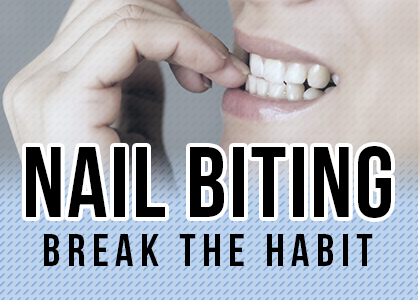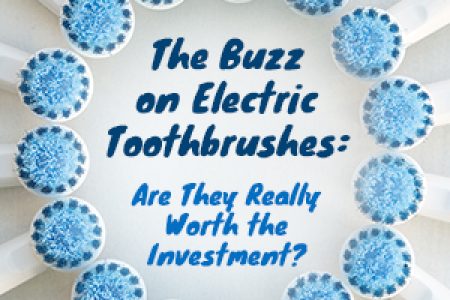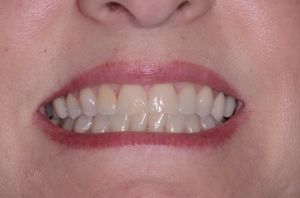We all have those nervous habits we turn to when we feel awkward, stressed, or just plain bored. If your choice vice is biting your nails, you need to know that it can cause a lot of distress on your oral health and overall health. Dr. Saydyk, Gilbert dentist shares why nail biting is so bad for you and how you can break the habit.

Downsides of Biting your Nails
It may seem harmless, but nail biting can actually:
- Chip your teeth
- Hurt your jaw (due to frequently jutting your teeth out to bite)
- Increase your risk of tooth loss and tooth root loss if you have braces
- Tear and damage your gums
- Spread bacteria from under the fingernail into your mouth, bloodstream, and body
Not to mention the painful cuticles around each nail and your increased risk of bruxism (teeth grinding and clenching with painful side effects). According to the General Dentistry journal, people who bite their nails and also chew on things like pencils are at a greater risk of having bruxism. Signs of bruxism include worn tooth enamel, sensitive teeth, and pain and popping in the jaw.
Biting your nails makes you look less confident and it certainly won’t increase your chances of a successful date or job interview. The most obvious downside here is, of course, jagged, unattractive nails, but it’s what’s living under your nails that might be the ultimate factor in your decision to quit the habit. Your fingertips are a cesspool of germs, and various types of bacteria, fungus, and yeast can live under your nails, including fecal matter and staph infection. Gross!
Why We Bite our Nails
Don’t get down on yourself for biting your nails but do talk with your dentist if you want to break the habit. Biting your nails is a mindless action we slip into mostly for emotional and mental reasons. You might consider seeing a counselor to benefit your mental health, or finding something safer to fidget with when you feel stressed or anxious. (Fidget spinners, anyone?)
Adults and children alike struggle with nail biting. If you are the parent of a child who bites their nails, talk with the child and their dentist about how and why to break the habit. Underlying anxiety could be causing the child to resort to nail biting to release stress.
Break Your Nail Biting Habit
If you want to stop yourself from biting your nails, try using bitter-tasting nail polish or a mouthguard. Anything that will protect your teeth and make you take your hands out of your mouth. You can also talk with your Gilbert dentist for more suggestions.
Whenever you start trying to break the habit, set small and manageable goals such as going one hour without biting. Slowly increase the hours and days until you can’t remember the last time you bit your nails.
Any time you’re trying to stop or start a new habit, you’ll need something to fill the space and get your mind off the temptation. Try sipping water every time you want to bite your nails, chewing sugarless gum, or get up and do a brief stretch. Don’t be too harsh if it takes a while, habits can be very hard to break, even if you know how bad they are!
Stoneridge Dental is here for any oral health and overall health questions and goals you may have. Make an appointment today if you’re looking for a professional dentist to help you feel and smile your best!
The content of this blog is not intended to be a substitute for professional medical advice, diagnosis, or treatment. Always seek the advice of qualified health providers with questions you may have regarding medical conditions.
Sources



